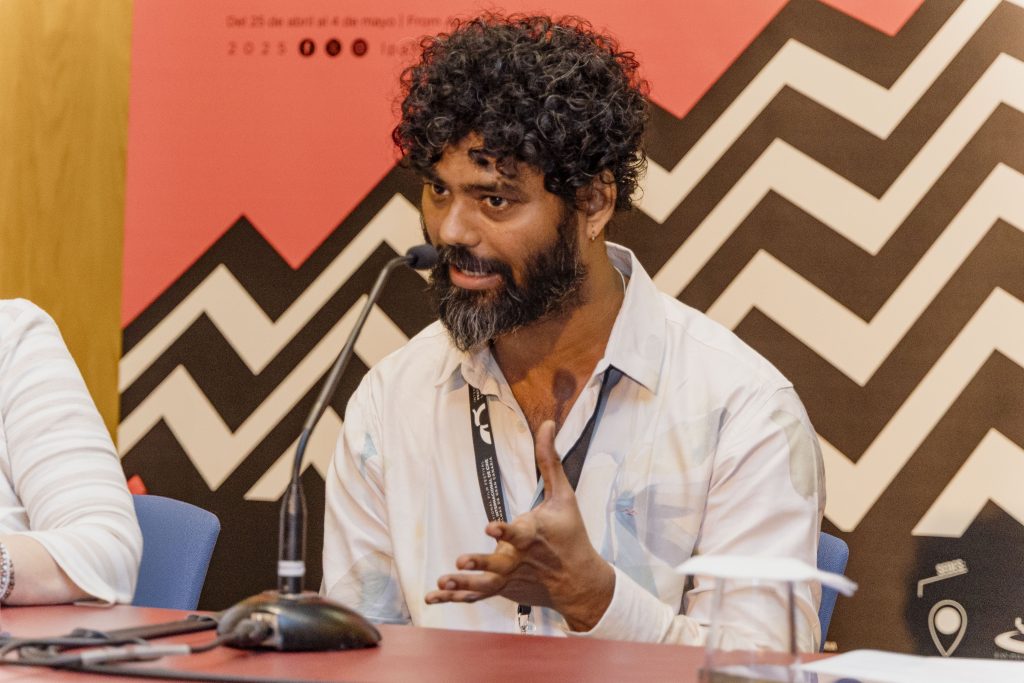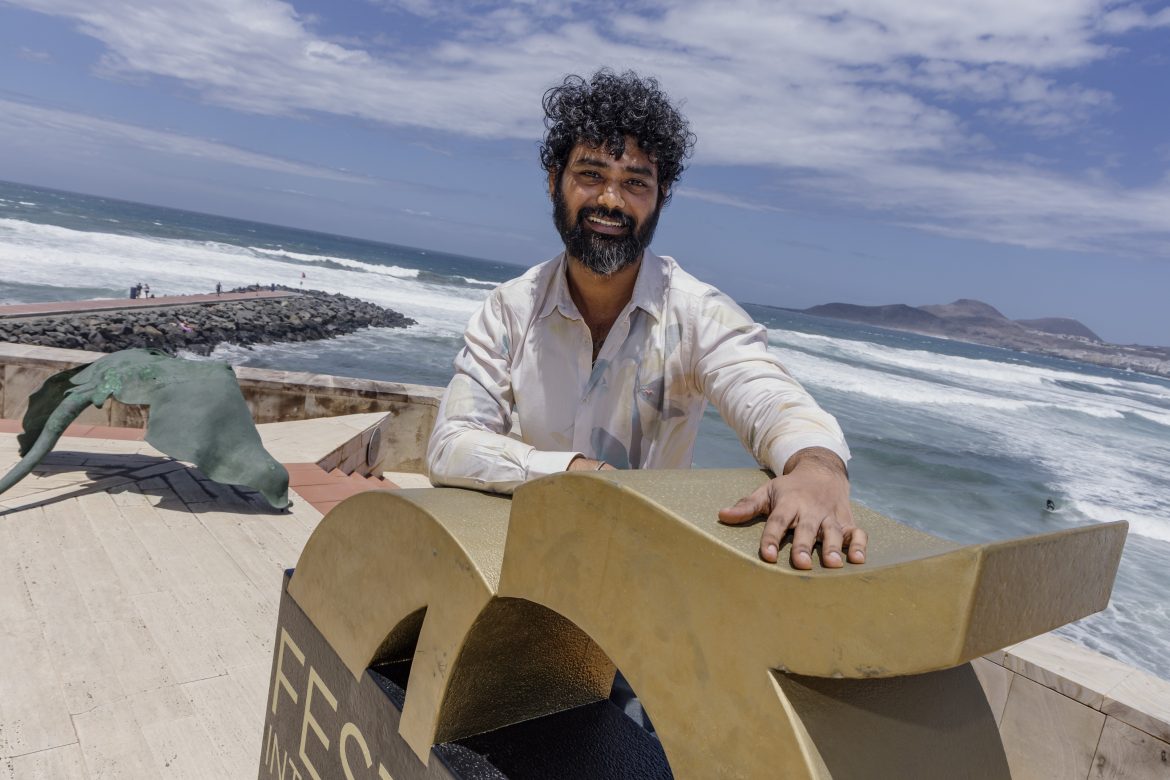• This film by the Indian filmmaker arrives in the Gran-Canarian capital after winning the Grand Jury Prize at Cannes and being selected at Buenos Aires or San Francisco

05/01/2025. ALFREDO KRAUS AUDITORIUM. LAS PALMAS DE GRAN CANARIA. FILMMAKER ROHAN PARASHURAM KANAWADE. PICTURES BY GERARDO OJEDA.
Las Palmas de Gran Canaria, Thursday, May 1, 2025.- Cactus Pears (Sabar Bonda) (India, United Kingdom, Canada, 2025, 112 min.), by Indian filmmaker Rohan Parashuram Kanawade, is competing for the Golden Lady Harimaguada of this 24th Las Palmas de Gran Canaria International Film Festival’s Official Section. His debut film tells the story of a unique relationship between a young man returning to his home village and a farmer who is under pressure to get married. Parashuram Kanawade himself met the media at the Alfredo Kraus Auditorium to talk about his motivations as the author of a piece which, with homosexuality as its main theme, has become the first Indian fiction film to win the Grand Jury Prize at Sundance.
In addition, Cactus Pears has also been nominated for Best International Film at the Buenos Aires International Festival of Independent Cinema and for the Golden Gate Award at the San Francisco International Film Festival. Both the critics’ response and its impact within the festival circuit are the result of Kanawade’s personal venture, one in which he directly exposes himself: the filmmaker has transferred onto the film his experience during his father’s funeral in their home village. He had avoided returning home because he did not want to hear anymore about his so-called obligation to get married. And, ironically, it was there where he ended up coming up with the idea for this special story.
“I did get inspired by my own experience,” confirmed the director, who also claimed that ninety percent of his film is fiction, though based on an episode of his past: he remembered his return home to attend his father’s funeral and be reunited with his mother and the rest of his family, “without being prepared to come out of the closet.” While he was there enduring all that marriage pressure, he wondered “what if I had a friend in this village who knew about me.”
And that is exactly the intimate relationship he explores in Cactus Pears, a film dealing with homosexuality as its main theme and based on personal memories, but in which “I changed a lot of details” in order to find the best possible result from a cinematographic standpoint.
When asked about the impact of such theme in his country’s cinema industry, Kanawade claimed that it is not uncommon and that it has been approached both in Marathi (the filmmaker’s mother tongue) theater and in Bollywood cinema, although from a point of view conditioned by social conventions and preconceived ideas.
“But at the end of the day,” he emphasized, “their representation is still an imagined version of queer life, which is not an accurate one.” That is why he tried to take inspiration from the kind of life he had lived, to be closer to reality while avoiding those tragic endings to which, in his opinion, tend “most films about queer life in India.”
In fact, Kanawade continued, “not only queer people but even heterosexual people are really bored of it, they don’t want to see tragic endings at all anymore.” The filmmaker shared with the press that he, for example, hasn’t had any tragic ending: “I live with my partner, I have so many friends who are in their sixties and live with their partners.” And because he doesn’t like “that romanticism towards sadness when people are making films,” he “wanted to change that trope.”
Thus, the author chose to write “a hopeful ending, not a completely happy one, but something hopeful where you at least feel that these two characters took a step towards exploring their relationship, love and future together.” And he did it without renouncing to Marathi, his mother tongue, in a society in which Hindi is the dominant culture.
Kanawade noted that this fact, in addition to the theme of his story, didn’t make things easier from a production standpoint. Especially in his case, because he did not study filmmaking: “I come from interior designing.” He spent five years trying to find funding for his film, something he finally managed to do thanks to his main producer, who mortgaged his Mumbai house, and the help and financial support he got from several friends all over the world.
The Indian filmmaker is happy because the trust they put in him and his work “has finally paid off. Now the world is getting to see the film and I’m happy they are liking it.” Regarding his success at Sundance, Kanawade explained that it has meant a lot to him because “it enabled us to travel all around the world,” and, more importantly, they got worldwide distribution, so now “regular audiences can watch the film in theaters.”
The tone of his answers was, in any case, in line with his on-screen story’s freshness and honesty. At the end of the press conference, the filmmaker asked the audience that “if you like the film, please tell your friends and family because it is getting theatrical release everywhere . . . It would be a big support to us, and to independent cinema, too.”
Cactus Pears’ last screening has been scheduled for next Saturday, May 3, at 5:45 p.m. at Cine Yelmo Las Arenas Screen 6.
Partners, sponsors and collaborators of the 24 FICLPGC
The Las Palmas de Gran Canaria International Film Festival, organized by the Culture area of the Gran-Canarian capital’s City Council through Promoción de la Ciudad de Las Palmas de Gran Canaria, has received public assistance by the ICAA [Institute of Cinematography and Audiovisual Arts], the Visitors’ Program for the Internationalization of Spanish Culture (PICE), of the Spanish Public Agency for Cultural Action (AC/E), as well as public support from Promotur Turismo Islas Canarias.
Among the Festival’s collaborators we may find Fundación Auditorio Teatro, Cines Yelmo, Las Arenas Shopping Center and Hotel Cristina by Tigotan, places which also function as venues or hold activities of the film event; as well as other institutions and companies such as Sagulpa, Toyota, Royal Bliss, Fuze Tea, Coca Cola, Sholeo Lodge, Audiovisuales Canarias, Music Library &SFX, Blackout Films and International Bach Festival. Likewise, its market, MECAS, has been possible thanks to the sponsorship of the Gran Canaria Film Commission-Sociedad de Promoción Económica de Gran Canaria and the support of Proexca.
The University of Las Palmas de Gran Canaria, the Mid Atlantic University, Digital 104, the Audiovisual Cluster of the Canary Islands, the Association of Women Filmmakers and Audiovisual Media CIMA, the Cartagena International Film Festival, the Gijón International Film Festival, the Barcelona Independent Film Festival, the Tres Puertos Laboratory, Barcelona’s ESCAC, and Very Good Script, Freak World and Fimucité are also collaborators.
Share this Post

